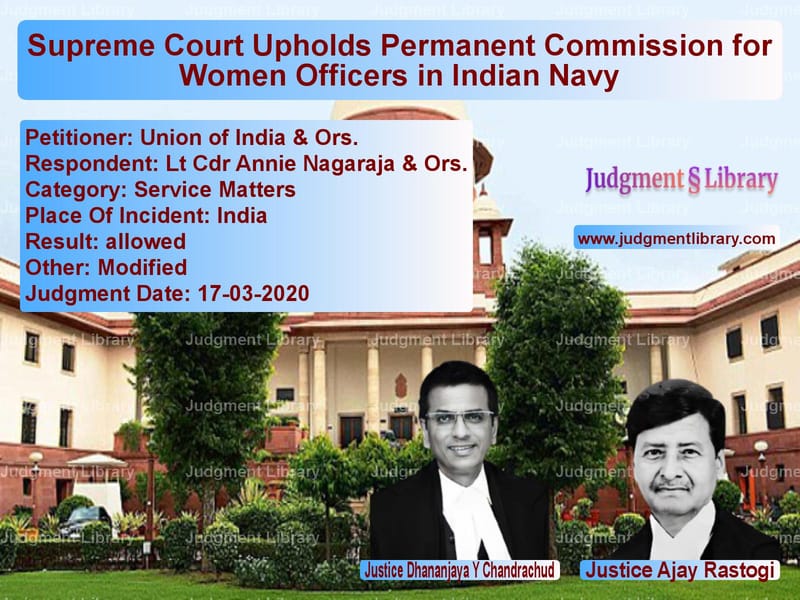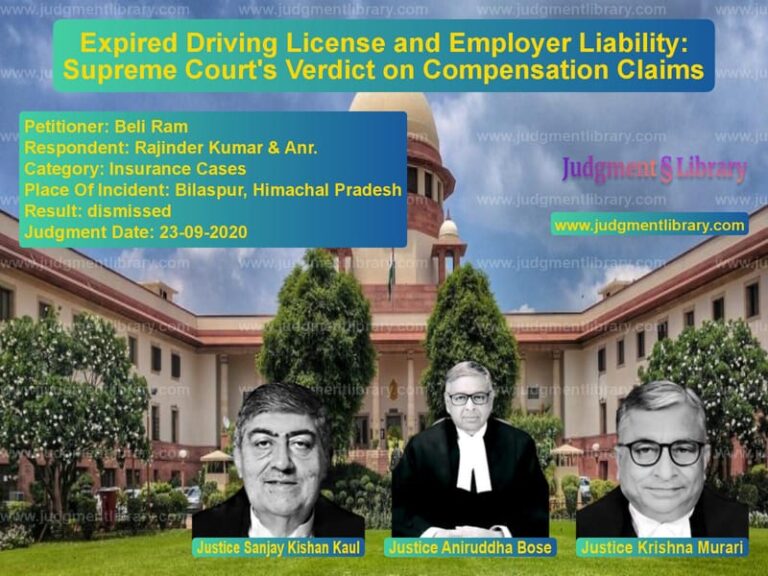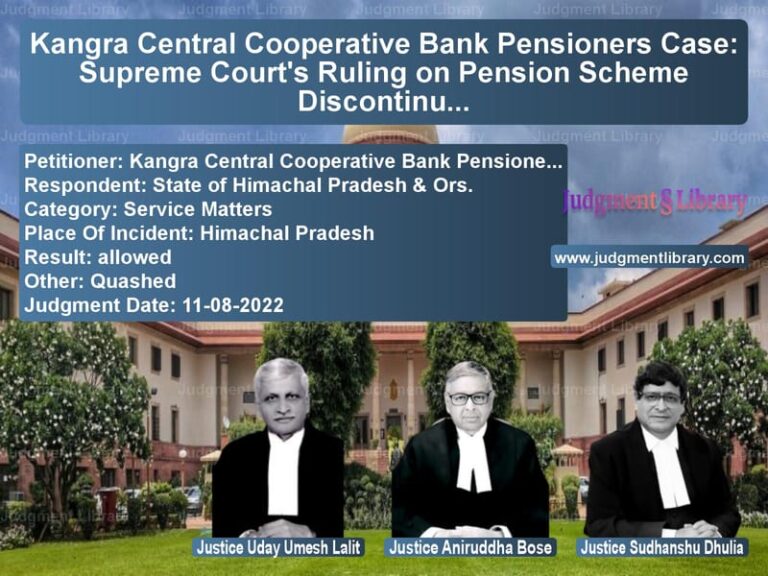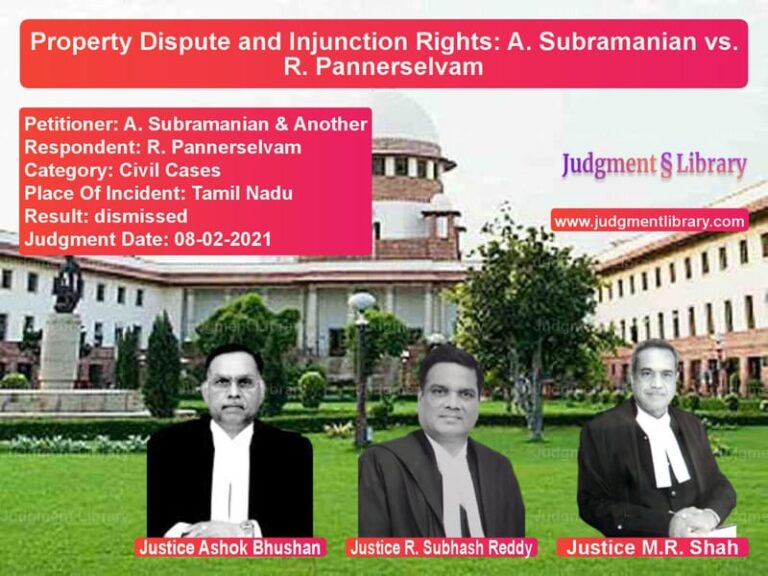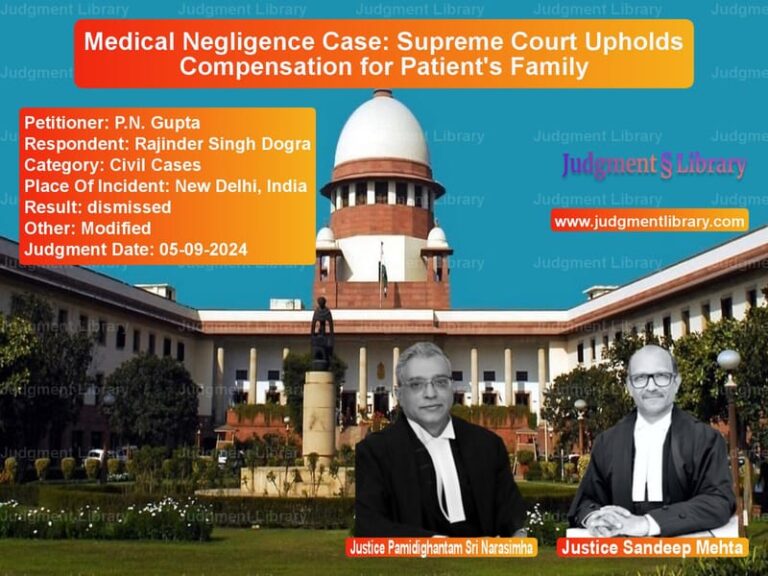Supreme Court Upholds Permanent Commission for Women Officers in Indian Navy
The case of Union of India & Ors. vs. Lt Cdr Annie Nagaraja & Ors. is a landmark judgment in the fight for gender equality in the Indian Armed Forces. The Supreme Court of India was called upon to decide whether women Short Service Commission (SSC) officers in the Indian Navy were entitled to Permanent Commission (PC). The ruling examined policies, statutory frameworks, and the systemic discrimination faced by women officers.
Background of the Case
The case arose from two major disputes: one before the Delhi High Court, led by Lt Cdr Annie Nagaraja, and another before the Armed Forces Tribunal (AFT), led by Cdr Priya Khurana. Women officers who had served for over 14 years in the Navy on SSCs challenged their discharge from service without being granted PCs, even though their male counterparts were being considered for PC.
Petitioner’s Arguments
The petitioners, comprising women officers from various naval branches, argued:
- They had been assured consideration for PC in recruitment advertisements and official policy documents.
- Their exclusion from PC was discriminatory, violating Articles 14 and 15 of the Indian Constitution.
- Regulation 203 of the Navy Regulations allowed for the grant of PC and should be applied to them.
- The government’s policy change in 2008, making PC applicable only to future batches, was arbitrary and unfair.
Respondent’s Arguments
The Union of India and the Ministry of Defence (MoD) argued:
- Granting PC to women in the Navy was a policy decision and could not be forced by the court.
- The Navy’s infrastructure was not equipped to accommodate women in combat or long-duration sea missions.
- The 2008 policy limiting PC to future batches was justified and could not be challenged retrospectively.
- The male-dominated structure of the Navy necessitated caution in integrating women into permanent roles.
Supreme Court’s Observations
The Supreme Court analyzed the historical and legal aspects of the case. Key observations included:
- Legal Entitlement: The Navy Regulations, particularly Regulation 203, did not prohibit women from being granted PC.
- Past Commitments: The MoD’s 1999 policy clearly stated that PC would be governed by Regulation 203, creating a legitimate expectation for women SSC officers.
- Gender Discrimination: The Court strongly condemned stereotypes that suggested women were unfit for naval roles due to physiological differences or societal obligations.
- Failure to Implement Policies: The Navy had not followed its own policies regarding PC, which disadvantaged women officers.
Final Judgment
The Supreme Court ruled:
“Women SSC officers shall be considered for the grant of PC, and their applications shall be evaluated based on inter-se merit, availability of vacancies, and recommendations of the Chief of Naval Staff.”
The Court also directed:
- Women officers currently in service must be considered for PC based on existing vacancies.
- The period of service required to apply for PC should be the same for men and women.
- Women officers in Logistics, Education, and Law cadres must be granted PC.
- Those who had retired due to non-grant of PC must be deemed to have completed pensionable service and be entitled to retirement benefits.
- Women officers wrongfully denied PC would be compensated with a lump sum of ₹25 lakhs each.
Impact of the Judgment
This landmark ruling ensures gender equality in the Indian Navy. Its key takeaways include:
- Strengthening Women’s Rights: The judgment ensures women officers receive equal treatment and career opportunities.
- Ending Gender Bias: It rejects outdated stereotypes and recognizes the competence of women in the armed forces.
- Policy Changes: The government must now ensure PC is granted fairly and that infrastructure limitations do not serve as excuses for gender discrimination.
- Pension and Financial Security: The ruling guarantees financial stability for retired officers who were previously denied benefits.
This ruling is a milestone in ensuring equal opportunities for women in the Indian Armed Forces, reinforcing the principles of fairness, equality, and merit-based advancement.
Petitioner Name: Union of India & Ors..Respondent Name: Lt Cdr Annie Nagaraja & Ors..Judgment By: Justice Dhananjaya Y Chandrachud, Justice Ajay Rastogi.Place Of Incident: India.Judgment Date: 17-03-2020.
Don’t miss out on the full details! Download the complete judgment in PDF format below and gain valuable insights instantly!
Download Judgment: Union of India & Ors vs Lt Cdr Annie Nagaraj Supreme Court of India Judgment Dated 17-03-2020.pdf
Direct Downlaod Judgment: Direct downlaod this Judgment
See all petitions in Employment Disputes
See all petitions in Promotion Cases
See all petitions in Recruitment Policies
See all petitions in Public Sector Employees
See all petitions in Judgment by Dhananjaya Y Chandrachud
See all petitions in Judgment by Ajay Rastogi
See all petitions in allowed
See all petitions in Modified
See all petitions in supreme court of India judgments March 2020
See all petitions in 2020 judgments
See all posts in Service Matters Category
See all allowed petitions in Service Matters Category
See all Dismissed petitions in Service Matters Category
See all partially allowed petitions in Service Matters Category

